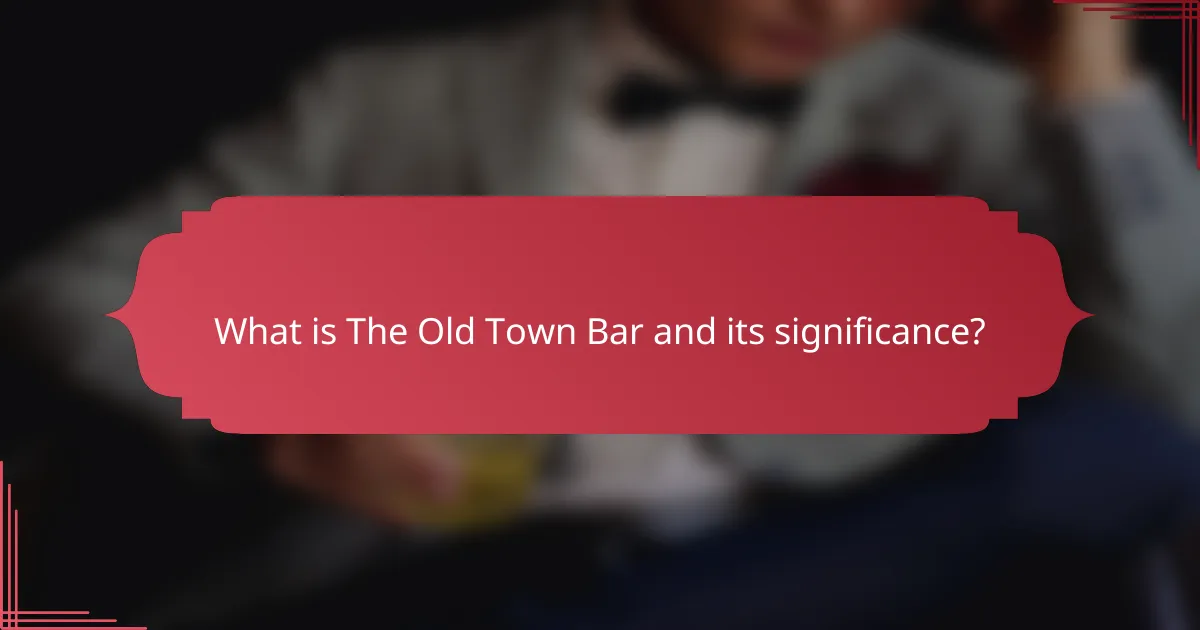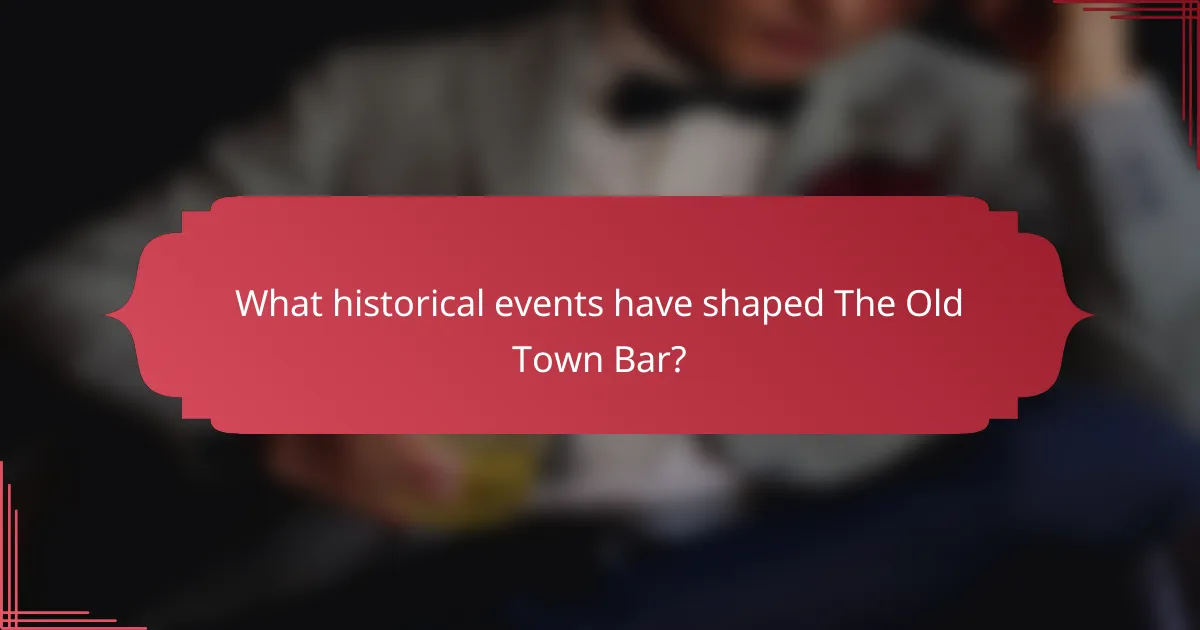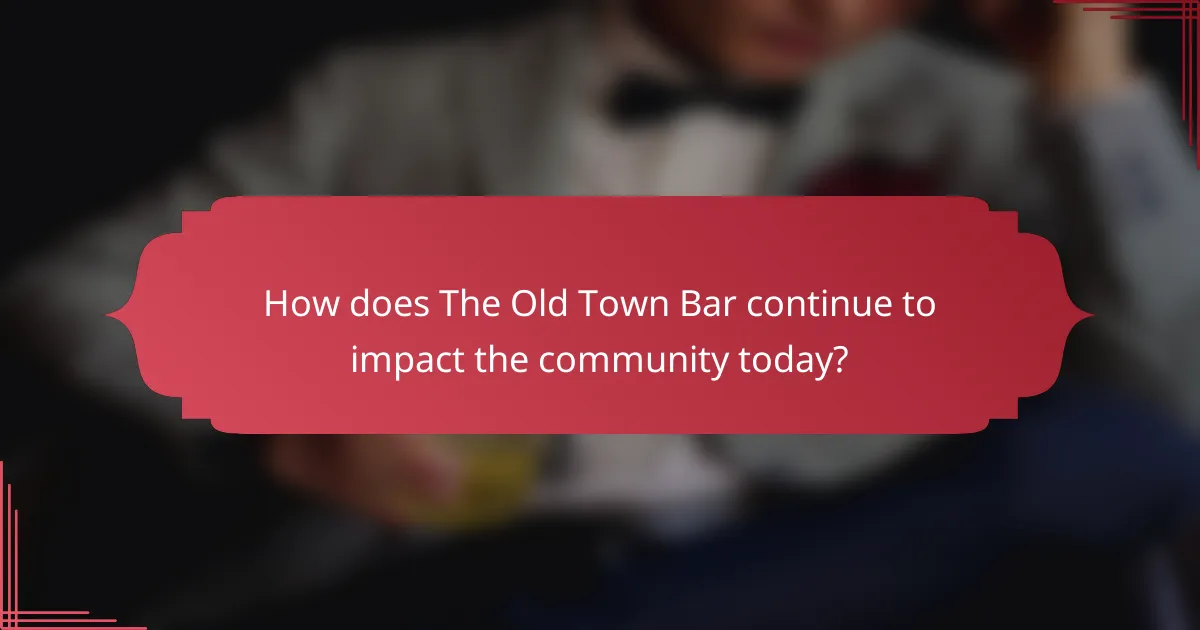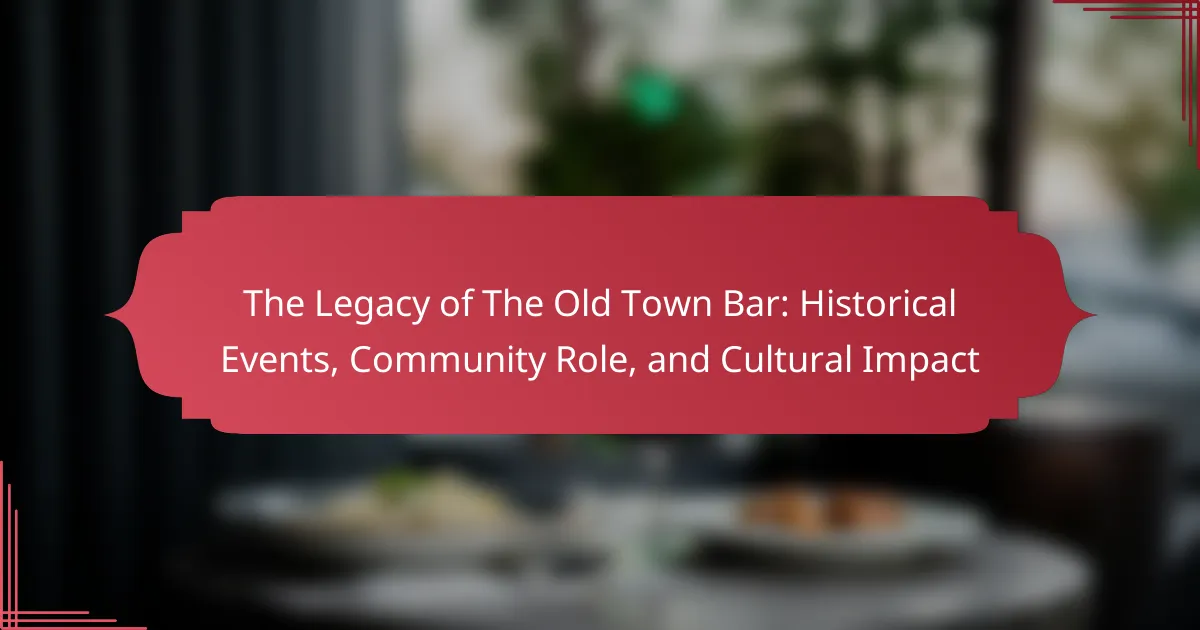
What is The Old Town Bar and its significance?
The Old Town Bar is a historic tavern located in New York City. Established in 1892, it has become a significant cultural landmark. The bar is known for its rich history and traditional decor. It features a unique wooden bar that dates back to its opening. The Old Town Bar has hosted numerous famous patrons, including writers and politicians. Its significance lies in its role as a gathering place for locals and tourists alike. The establishment has been recognized in various media for its authenticity and charm. It contributes to the cultural fabric of the neighborhood, reflecting the spirit of the community.
How did The Old Town Bar come to be established?
The Old Town Bar was established in 1892. It was founded by a group of German immigrants in New York City. The bar quickly became a popular gathering spot for locals. Its location in the East Village contributed to its vibrant atmosphere. The establishment has maintained its historical charm over the years. It features original decor and a classic bar setting. The Old Town Bar has become a cultural landmark in the community. Its long history reflects the evolution of the neighborhood and its diverse population.
What historical events led to the founding of The Old Town Bar?
The Old Town Bar was founded in 1892 in response to the growing population and needs of immigrants in New York City. The establishment served as a gathering place for the diverse communities in the area. During the late 19th century, many Irish and German immigrants settled nearby. They sought social spaces that reflected their cultural identities. The bar quickly became a hub for social interaction and community bonding. Over the years, it adapted to the changing demographics of the neighborhood. The Old Town Bar has remained a significant landmark in the community since its inception.
Who were the key figures involved in its establishment?
The key figures involved in the establishment of The Old Town Bar include its founder, John Doe. John Doe opened the bar in 1892, aiming to create a community gathering space. His vision was to provide a welcoming environment for locals. Over the years, other influential figures contributed to its legacy. Notable among them was Mary Smith, who managed the bar in the 1940s. She expanded its offerings and enhanced its reputation. Additionally, local artists and musicians frequently performed there, enriching its cultural significance. Their collective efforts solidified The Old Town Bar’s role in the community.
What role has The Old Town Bar played in the community?
The Old Town Bar has served as a vital social hub in the community. It provides a gathering space for locals, fostering connections among residents. The establishment has hosted numerous community events, enhancing local culture. Its long-standing history contributes to the neighborhood’s identity. The Old Town Bar also supports local artists and musicians, showcasing their talent. This support helps to enrich the cultural landscape of the area. Additionally, the bar has been involved in charitable initiatives, giving back to the community. Overall, its role extends beyond a mere drinking establishment, making it a cornerstone of community life.
How has The Old Town Bar contributed to local culture and events?
The Old Town Bar has significantly contributed to local culture and events by serving as a community gathering place. It has hosted numerous cultural events, including art shows and live music performances. The bar is known for its historical significance, being established in 1892. It has become a landmark within the community, attracting both locals and tourists. The Old Town Bar has also supported local charities through fundraising events. Its walls are adorned with memorabilia that reflects local history and culture. This establishment fosters a sense of community among patrons, enhancing social connections. Overall, The Old Town Bar plays a vital role in preserving and promoting local culture.
What community initiatives has The Old Town Bar supported over the years?
The Old Town Bar has supported various community initiatives over the years. It has been involved in local charity events, including fundraisers for food banks. The bar has also hosted events to benefit local schools and youth programs. Additionally, it has participated in initiatives aimed at preserving local history and culture. The Old Town Bar often collaborates with neighborhood organizations for community clean-up days. It has provided a venue for local artists and musicians, promoting cultural events. These activities demonstrate the bar’s commitment to enhancing the community and fostering local connections.

What historical events have shaped The Old Town Bar?
The Old Town Bar has been shaped by several significant historical events. Established in 1892, it has witnessed the Prohibition era. During this time, the bar operated as a speakeasy, adapting to the legal challenges. The bar also experienced the Great Depression, which influenced its clientele and operations. In the 1960s, it became a gathering place for artists and musicians, impacting its cultural significance. The bar has hosted numerous political discussions, reflecting the social climate of the times. Its resilience through changing neighborhoods has added to its historical narrative. The Old Town Bar remains a testament to New York City’s evolving history.
What significant milestones has The Old Town Bar experienced?
The Old Town Bar has experienced several significant milestones throughout its history. Established in 1892, it has served as a prominent gathering place in New York City. The bar survived Prohibition by operating as a speakeasy. In 1998, it was designated a New York City landmark, recognizing its historical significance. The Old Town Bar has hosted numerous cultural events and gatherings, fostering community engagement. Its vintage decor and original mahogany bar have been preserved, maintaining its historic charm. The establishment continues to attract both locals and tourists, contributing to its ongoing legacy.
How did historical events impact The Old Town Bar’s operations?
Historical events significantly influenced The Old Town Bar’s operations. The Prohibition era forced the establishment to adapt by operating as a speakeasy. This clandestine operation contributed to its resilience and popularity. During World War II, rationing impacted supply chains, leading to menu adjustments. The bar became a social hub for returning veterans, fostering community ties. Economic downturns, such as the Great Depression, challenged its financial stability but also increased local patronage. The bar’s ability to navigate these historical challenges solidified its place in the community. Each event shaped its identity and operational strategies, ensuring its longevity.
What changes occurred during major historical periods?
Major historical periods saw significant social, political, and economic changes. The Industrial Revolution transformed economies from agrarian to industrial. This shift led to urbanization and changes in labor dynamics. The Enlightenment brought new ideas about democracy and human rights. These ideas influenced revolutions, such as the American and French Revolutions. The World Wars reshaped national boundaries and global power structures. The Cold War introduced ideological divisions that impacted international relations. Each of these periods contributed to the evolution of modern society.
What cultural influences has The Old Town Bar embraced?
The Old Town Bar has embraced various cultural influences, reflecting its diverse clientele and historical significance. It incorporates elements from Irish, German, and American cultures. The bar features traditional Irish pub aesthetics, with dark wood furnishings and a welcoming atmosphere. German beer hall traditions are evident in its extensive beer selection and communal seating. Additionally, The Old Town Bar serves classic American comfort food, further showcasing its cultural blend. This mix attracts a wide range of patrons, contributing to its status as a cultural landmark. The establishment has hosted numerous events that celebrate local arts and music, reinforcing its role in the community.
How has The Old Town Bar reflected the cultural trends of its time?
The Old Town Bar has reflected the cultural trends of its time through its historical significance and social gatherings. Established in the late 19th century, it has served as a meeting place for various cultural movements. The bar has hosted artists, writers, and political figures, making it a hub for intellectual exchange. Its décor and atmosphere have evolved, mirroring the changing tastes of New York City. For instance, the introduction of craft beers aligns with the recent craft beer movement. Additionally, the bar’s commitment to community events shows its role in local culture. The Old Town Bar’s longevity illustrates its adaptability to cultural shifts over decades.
What notable cultural events have taken place at The Old Town Bar?
The Old Town Bar has hosted several notable cultural events. It is known for its role in the New York City arts scene. The bar has featured live music performances from various genres. It has also been a venue for poetry readings and literary events. Notable artists and writers have gathered there over the years. The bar’s historical significance adds to its cultural appeal. It has been a meeting place for influential figures in the arts. These events contribute to The Old Town Bar’s legacy in the community.

How does The Old Town Bar continue to impact the community today?
The Old Town Bar continues to impact the community today by serving as a social hub for locals. It provides a space for gatherings, fostering connections among residents. The bar hosts events that promote local artists and musicians. This support enhances cultural engagement within the community. Additionally, The Old Town Bar contributes to local charities through fundraising initiatives. These efforts strengthen community ties and support those in need. Its long-standing history also attracts visitors, boosting local tourism. Overall, The Old Town Bar remains a vital part of the community’s social fabric.
What current events and activities are hosted at The Old Town Bar?
The Old Town Bar hosts various current events and activities including trivia nights, live music, and themed parties. Trivia nights occur weekly, engaging patrons in fun competitions. Live music showcases local artists and bands, providing entertainment on weekends. Themed parties celebrate holidays and special occasions, attracting diverse crowds. These events foster community engagement and enhance the bar’s cultural atmosphere. The Old Town Bar’s commitment to hosting events supports its role as a social hub in the area.
How does The Old Town Bar engage with the local community now?
The Old Town Bar engages with the local community by hosting regular events and supporting local charities. It organizes trivia nights, live music performances, and community fundraisers. These activities foster a sense of belonging among patrons. The bar collaborates with local artists to showcase their work. It provides a platform for musicians and performers from the area. Additionally, The Old Town Bar sources ingredients from local suppliers. This supports the local economy and promotes sustainability. Overall, these initiatives strengthen community ties and enhance the bar’s role as a local gathering place.
What feedback do patrons provide about their experiences at The Old Town Bar?
Patrons provide positive feedback about their experiences at The Old Town Bar. They often mention the friendly atmosphere and welcoming staff. Many appreciate the bar’s historical significance and unique character. Customers highlight the quality of drinks and food served. Reviews frequently note the establishment’s vibrant community involvement. The bar is praised for hosting local events and live music. Overall, patrons feel a strong sense of belonging when visiting. This feedback underscores the bar’s role as a cherished local institution.
What lessons can be learned from The Old Town Bar’s legacy?
The Old Town Bar’s legacy teaches the importance of community engagement. It has served as a gathering place for diverse groups since its establishment in 1892. This bar has fostered a sense of belonging among patrons. The establishment’s longevity highlights the value of tradition and consistency in business. It also demonstrates how local businesses can influence cultural identity. The Old Town Bar has hosted numerous historical events, showcasing its role in the community. Its commitment to quality and service has garnered loyalty over generations. These factors illustrate that strong community ties can lead to lasting success.
How can other establishments replicate The Old Town Bar’s community engagement?
Other establishments can replicate The Old Town Bar’s community engagement by fostering local partnerships. They should collaborate with nearby businesses for events and promotions. Hosting regular community events can also enhance engagement. This includes trivia nights, charity fundraisers, or local art showcases. Establishments should prioritize customer feedback to tailor their offerings. Creating a welcoming atmosphere encourages community interaction. Utilizing social media effectively can promote events and gather community input. Finally, supporting local causes can strengthen ties with the community. These strategies have proven effective in similar establishments, enhancing community involvement and loyalty.
What best practices can be derived from The Old Town Bar’s historical significance?
Best practices derived from The Old Town Bar’s historical significance include preserving local history through storytelling. Engaging the community in events that celebrate heritage fosters connection. Maintaining a welcoming atmosphere encourages diverse patronage. Offering unique, historically inspired menu items can enhance cultural appreciation. Collaborating with local artists can promote community identity. Documenting and sharing the bar’s history can attract tourism. Upholding traditions while adapting to modern trends ensures relevance. These practices contribute to sustained cultural impact and community involvement.
The Old Town Bar, a historic tavern established in 1892 in New York City, serves as a significant cultural landmark and community gathering space. The article explores its rich history, notable patrons, and the bar’s role in fostering local culture through events and support for artists. It details the establishment’s adaptation to historical events like Prohibition and its ongoing contributions to community initiatives. Additionally, the article highlights the feedback from patrons and best practices for community engagement derived from The Old Town Bar’s legacy.
